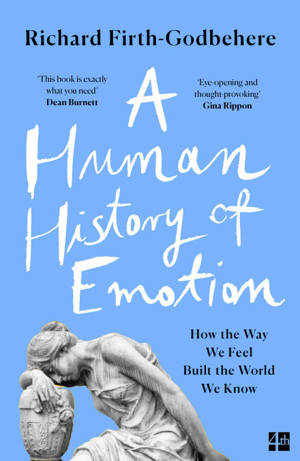
Je cadeautjes zeker op tijd in huis hebben voor de feestdagen? Kom langs in onze winkels en vind het perfecte geschenk!
- Afhalen na 1 uur in een winkel met voorraad
- Gratis thuislevering in België vanaf € 30
- Ruim aanbod met 7 miljoen producten
Je cadeautjes zeker op tijd in huis hebben voor de feestdagen? Kom langs in onze winkels en vind het perfecte geschenk!
- Afhalen na 1 uur in een winkel met voorraad
- Gratis thuislevering in België vanaf € 30
- Ruim aanbod met 7 miljoen producten
Zoeken
A Human History of Emotion E-BOOK
How the Way We Feel Built the World We Know
Richard Firth-Godbehere
E-book | Engels
€ 4,39
+ 4 punten
Uitvoering
Omschrijving
How have our emotions shaped the course of human history?
And how have our experience and understanding of emotions evolved with us?
We humans like to think of ourselves as rational creatures, who, as a species, have relied on calculation and intellect to survive. But many of the most important moments in our history had little to do with cold, hard facts and a lot to do with feelings. Events ranging from the origins of philosophy to the birth of the world’s major religions, the fall of Rome, the Scientific Revolution, and some of the bloodiest wars that humanity has ever experienced can’t be properly understood without understanding emotions.
In A Human History of Emotion, Richard Firth-Godbehere takes readers on a fascinating and wide-ranging tour of the central and often under-appreciated role emotions have played in human societies around the world and throughout history – from Ancient Greece to Gambia, Japan, the Ottoman Empire, Britain, and beyond.
Drawing on psychology, neuroscience, philosophy, art and religious history, A Human History of Emotion vividly illustrates how our understanding and experience of emotions has changed over time, and how our beliefs about feelings – and our feelings themselves – profoundly shaped us and the world we inhabit.
And how have our experience and understanding of emotions evolved with us?
We humans like to think of ourselves as rational creatures, who, as a species, have relied on calculation and intellect to survive. But many of the most important moments in our history had little to do with cold, hard facts and a lot to do with feelings. Events ranging from the origins of philosophy to the birth of the world’s major religions, the fall of Rome, the Scientific Revolution, and some of the bloodiest wars that humanity has ever experienced can’t be properly understood without understanding emotions.
In A Human History of Emotion, Richard Firth-Godbehere takes readers on a fascinating and wide-ranging tour of the central and often under-appreciated role emotions have played in human societies around the world and throughout history – from Ancient Greece to Gambia, Japan, the Ottoman Empire, Britain, and beyond.
Drawing on psychology, neuroscience, philosophy, art and religious history, A Human History of Emotion vividly illustrates how our understanding and experience of emotions has changed over time, and how our beliefs about feelings – and our feelings themselves – profoundly shaped us and the world we inhabit.
Specificaties
Betrokkenen
- Auteur(s):
- Uitgeverij:
Inhoud
- Aantal bladzijden:
- 336
- Taal:
- Engels
Eigenschappen
- Productcode (EAN):
- 9780008393779
- Verschijningsdatum:
- 1/11/2021
- Uitvoering:
- E-book
- Beveiligd met:
- Adobe DRM
- Formaat:
- ePub

Alleen bij Standaard Boekhandel
+ 4 punten op je klantenkaart van Standaard Boekhandel
Beoordelingen
We publiceren alleen reviews die voldoen aan de voorwaarden voor reviews. Bekijk onze voorwaarden voor reviews.









